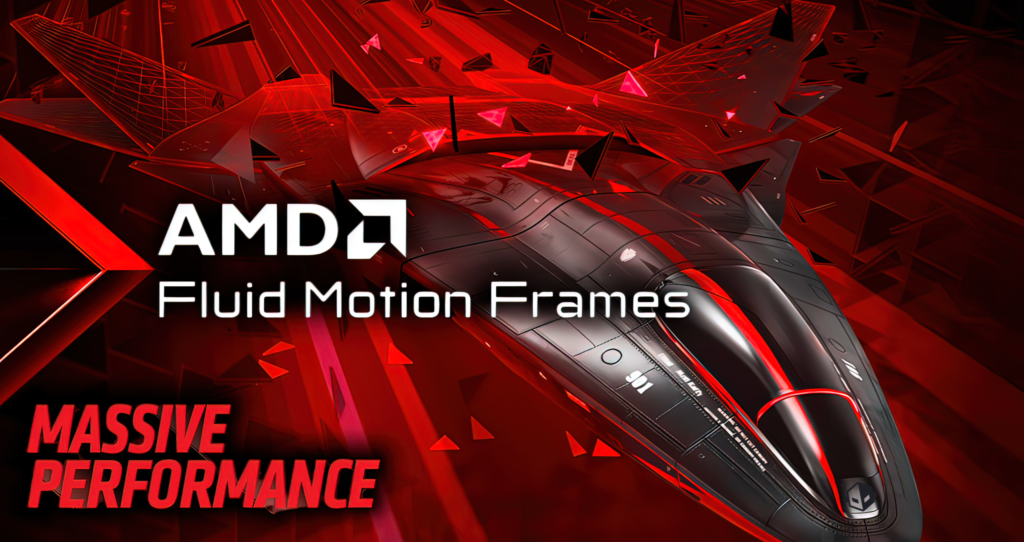AMD Fluid Motion Frames Technology
The long-awaited introduction of AMD’s Fluid Motion Frames technology has finally taken place in the Adrenaline preview driver, which offers compatibility for a total of twelve different games. This event has been the subject of much speculation and anticipation.
Because to FSR 3 and Fluid Motion Frame Technologies, AMD’s “Upscaling” Capabilities have undergone a substantial improvement in recent years.
Team Red has made great strides in the development of its upscaling technology with the release of FSR 3, as well as other games such as Forspoken and Immortals of Aveum. This is especially true when taking into consideration how recently FSR 3 was made available to the public. In comparison to AMD’s Fluid Motion Frames (AFMF), which provides support for a broad selection of games such as Starfield and Red Dead Redemption 2, the number of games that are compatible with FSR 3 is significantly smaller.
The titles featuring compatibility with AFMF are listed below:
| A Plague Tale – Requiem | Borderlands 3 | Control | Dead Space |
| Deep Rock Galactic | Dying Light 2 | Far Cry 6 | Ghostwire: Tokyo |
| Hitman 3 | Hogwarts Legacy | Horizon Zero Dawn™ | Metro Exodus Enhanced Edition |
| Red Dead Redemption 2 | Resident Evil 3 | Resident Evil 4 | Shadow Of The Tomb Raider |
| Star Wars Jedi: Survivor™ | Starfield | The Last of Us™ Part 1 | The Witcher 3: Wild Hunt |
Radeon’s software and hardware are both compatible with one other
The most recent version of the AMD Software: Adrenalin Edition Technical Preview Driver for AMD Fluid Motion Frames, which is version 23.30.01.02, is compatible with the AMD Radeon RX 7900/7800/7700/7600 RDNA 3 GPUs.
At this point, the feature is being tested in preparation for its imminent preview release, and AMD is actively requesting input from players (using its Bug Tool) to help it become more helpful in the future.
Now, please brief me on AMD’s Fluid Motion Frames technology. I’m eager to learn more. There are a lot of individuals that think of it as an alternate to what NVIDIA has called their “Frame Generation.” This feature accomplishes, in layman’s words, the highest number of “frames-per-second” that is practical by conducting frame interpolation on the driver side.
In combination with FSR 3, AMD Fluid Motion Framesplans to enhance a gamer’s experience without the player ever having to be concerned about the performance output from his or her Radeon GPU. This is part of AMD’s overall goal to improve the gaming experience. Although it is expected that AFMF will provide support for all DX11/12 games, the preview driver presently only provides support for 12 DX12 games for the time being. It is anticipated that AFMF will give support for all DX11/12 games.
In recent years, AFMF has become a topic of discussion as a result of the fact that it does not require support on a “developer level” because it is already incorporated into your graphics drivers. This integration is what makes it a unique feature. In spite of this, it is necessary to highlight the fact that if you were to compare it to any of the aforementioned technologies, it would not even come close to being as excellent as NVIDIA’s DLSS 3 “Frame Generation” or AMD’s own FSR 3 with “Frame-Generation” if you were to do so.
AMD Fluid Motion Frames in 12 Games

AMD Games with Fluid Motion Frames Support
Installing AMD’s preview driver will allow you to activate the feature; however, it is crucial to bear in mind that the AFMF is still in its developmental phases, and as a consequence, you may have interruptions while you are using it. bear this in mind before activating the function. We put the technology through its paces by employing it in Forspoken, and it was successful in performing its primary function, which was to boost your frame rate by a factor of two through the use of interpolation:
In the not too distant future, AMD plans to restrict access to its AFMF technology to only the Radeon RX 7000 line of graphics cards. This capability is not officially supported by any other Radeon GPU at this time. It’s possible that AMD’s choice will just be a temporary one given that AFMF is still in the testing phase. If this is the case, then in the not-too-distant future we could see it gaining support for architectures other than RDNA3.
Because of this, it is reasonable to say that Advanced Micro Devices (AMD) has actually increased the amount of work it is putting into bringing its upscaling technologies closer in line with those of its competitors. Because this component would place them in a better position than others, it will be intriguing to watch what types of performance increases FSR 3, specifically AFMF, brings in supported titles.

[…] has a competitive advantage over most rivals. The G274QPF-QD, which uses AMD FreeSync Premium technology, can synchronize GPU and display refresh rates for incredibly smooth […]
[…] goal in releasing the first preview driver for AMD Fluid Motion Frames in September 2023 was to give gamers a sneak peek at a revolutionary new technology that has the […]
[…] goal in releasing the first preview driver for AMD Fluid Motion Frames in September 2023 was to give gamers a sneak peek at a revolutionary new technology that has the […]